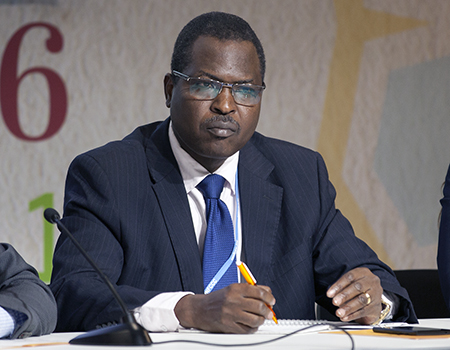Speaking on the need for and the implications of the Greenhouse Gas (GHG) Inventory Quality Assurance Workshop that held recently in Abuja and Lagos, Director, Department of Climate Change in the Federal Ministry of Environment, Dr Peter Tarfa, says that, besides being very fortunate to be picked for the training programme, Nigeria will immensely benefit in terms of socio-economic development

We are here for an international training supported by the UNFCCC with the assistance of the UNDP Regional Office in Lome, Togo. We are to train national experts on greenhouse gas (GHG) Inventory for Quality Assurance. This is a very critically required training that Nigeria has been able to get from the United Nations Framework Convention on Climate Change (UNFCCC). Several countries are clamouring for it; we have been fortunate to be picked.
Need for qualitative data
Under the Paris Agreement, there is the aspect of reporting and our report should be qualitative and transparent. To be able to do that, we need assurance on the quality of the data we are generating. We have been engaging consultants in the preparation of our National Communications and Biennial Update Report (BUR), among others. We as government are responsible for ensuring that what is submitted to the international community is factual and transparent and verifiable.
How do we do that if we don’t have the capacity to determine the quality of work, especially the data? How do we critique and say, “No, consultant, you did not give me the appropriate data?” How are we sure that the data from in an area (say energy or steel industry) are apt and reflective of the sector?
Transforming the economy
The whole idea about this reporting is to help the countries to go towards the low carbon development pathway. It will transform the economy, it will help us to be able to advise government appropriately. What will be the benefit now to the economy if we have energy generation through renewable energy, and then we have a healthier environment by being able to eliminate the generators. I can assure you that virtually every household in Nigeria owns a generator.
So, what is the contribution of that to the quality of our air? So, the climate change regime is a tool that is used for socio-economic development and by really getting all the data we can determine whether there is an emission reduction down the line it will help us to inform government to form policies that will lead to development.
Why Nigeria was selected
Nigeria was selected because: we have the largest economy in Africa; we are a major contributor to global emissions; and because of our socio-economic development, population, as well as level of industrialisation, given the oil and gas sector alone.
So, if we get it right, it is going to have a major input on the economy, and in meeting obligations under the Paris Agreement.
Implication of training for Nigeria at COP24
It will help us to clearly understand what kind of Rulebooks we should be clamouring for. When we are looking at the aspect of mitigation as a component of the Rulebook, we will be able to say okay, countries should be encouraged financially and technically including capacity building to put in place a robust natural GHG inventory framework.
Once we can do that, and it is continuous and becomes a seamless exercise, we will have data that will be useful for research, useful for economic planning, and meeting our obligation on NDCs. So, it is a very, very significant gathering and I must inform you also that the participants cut across all the major priority sectors like transport, agriculture, industry, power, oil & gas (NNPC), and private experts, who should be responsible for quality assurance when data is generated. All these entities are the data providers, including NiMET, we are the data controllers. But the quality assurance is supposed to be a national independent outfit.
Need for accredited entities
So, we will get to a stage where we accredit entities across the IPCC structure; we will accredit Nigeria entities the way you have accredited banks to do banking business. So, similarly, we must accredit these entities. They will be responsible for quality assurance in the area of energy, etc. All the criteria must be developed for accrediting them. It is a major requirement and if we set this right it will help us in creating jobs; it will transform the economy in the sense that the way we do business will change.
If we can eliminate all these emissions coming from generators, you have a serene, healthier environment. If you can also put in place quality and environmentally friendly transportation system in a city like Lagos, it will also lead to reduction of emissions and it will give us a healthier environment and people can move around in mass and more seamlessly via a cleaner transportation system. To do all these, we need to have data – quality data. The training is to ensure that the data being generated is qualitative for the different sectors.
Impact on the NDCs
It will have an impact on the Nationally Determined Contributions (NDCs) in the sense that, down the line in the year 2020, we must revise the NDCs. Our NDCs and the revision will be based on data. We will not backslide; rather we have committed to 20%. If we have data and see how what we are in, we can even beat our chest to say we are able to do up to 50% unconditionally. Nigeria is indeed very fortunate to be picked for this programme.
